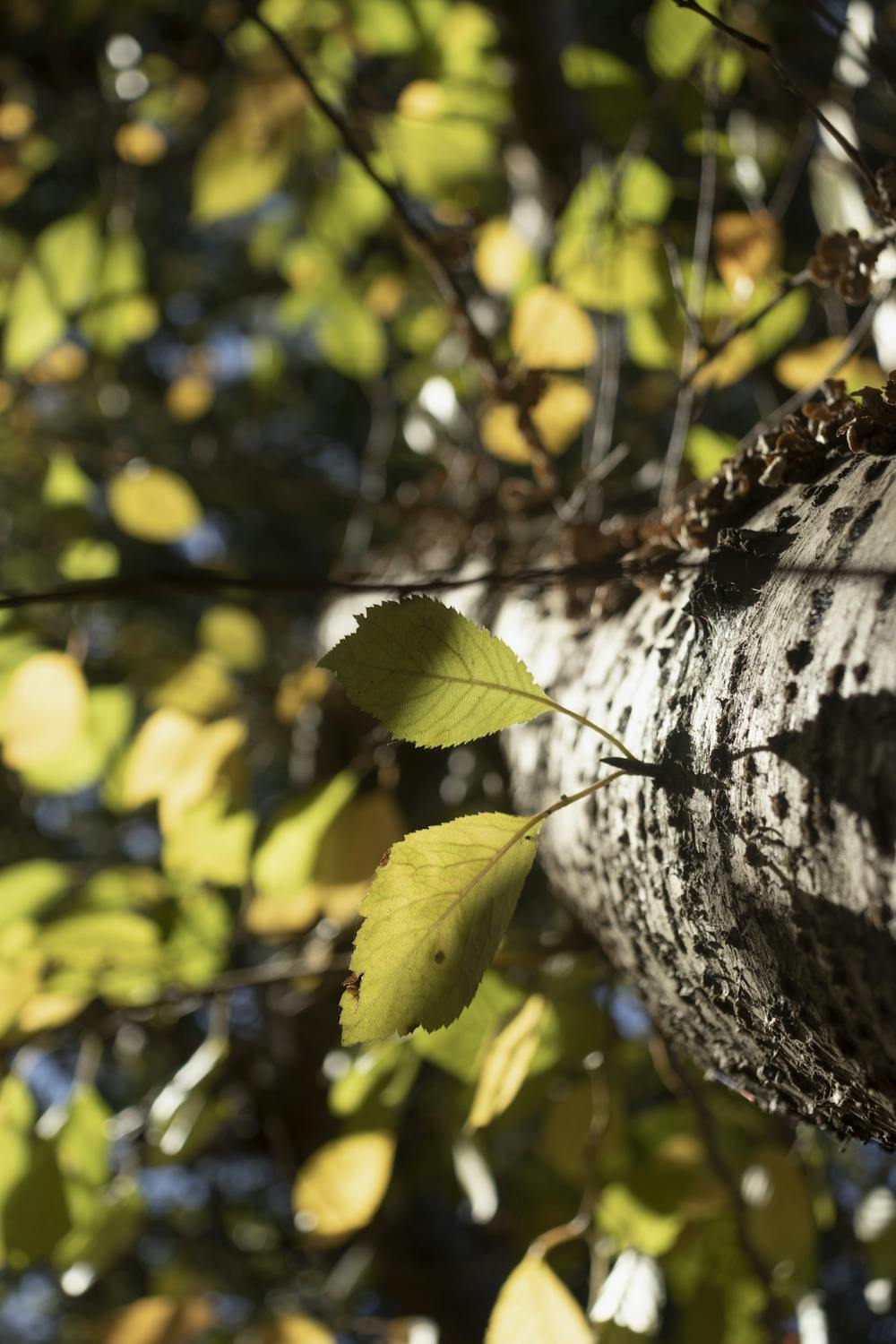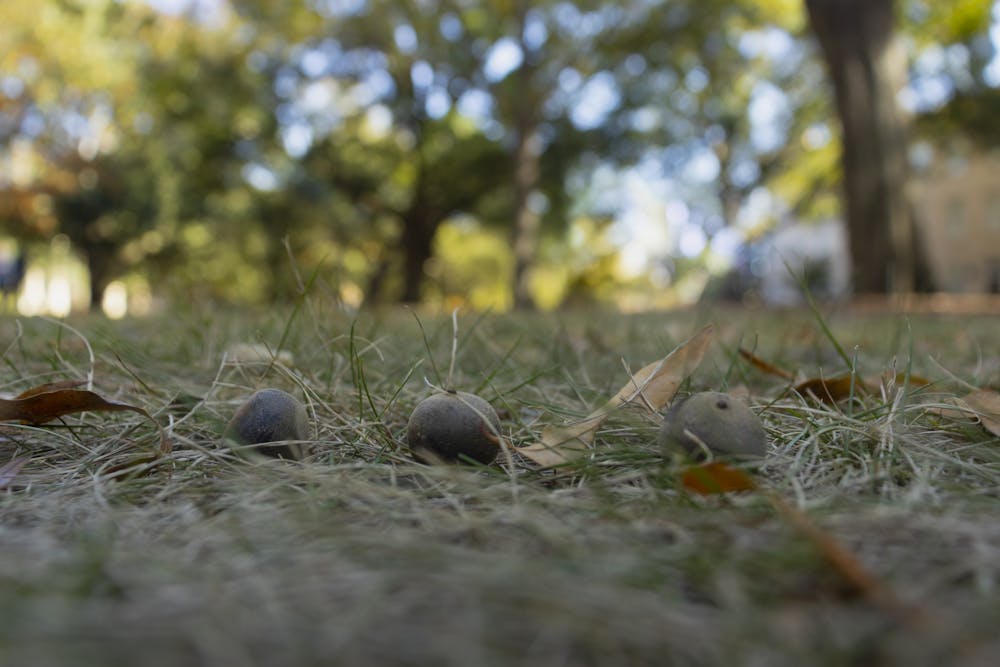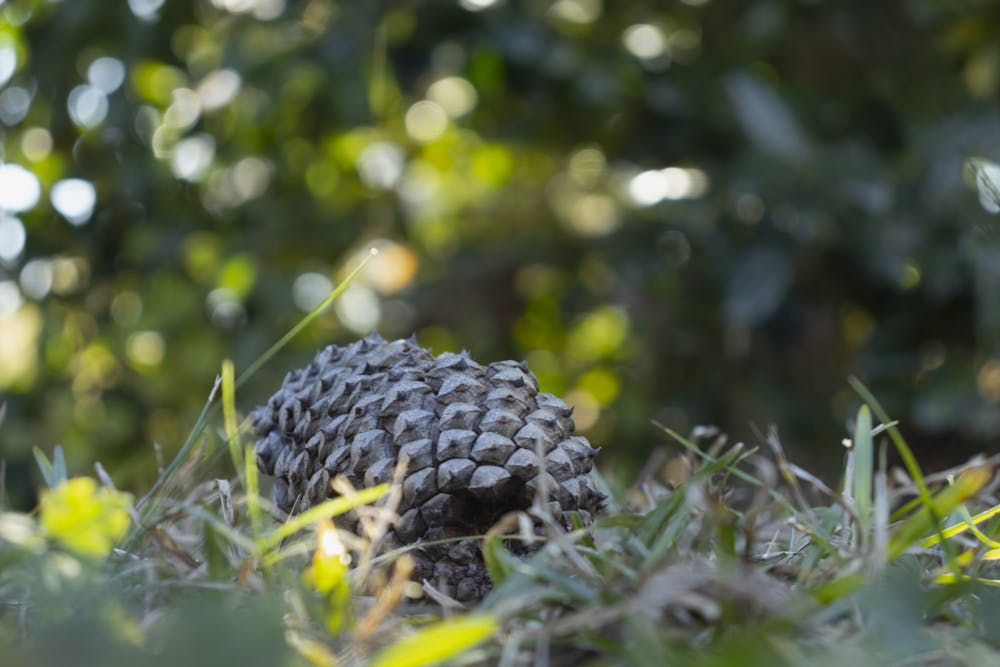Many of us have heard the saying "Put yourself in someone else's shoes." Well, I am now asking you to put yourself in something else's roots.
From the perspective of a plant, there doesn't seem to be a lot going on. They are rooted into the soil to live their lives in varying time spans, only to decay and grow again. It is a simple cycle to understand, and we as people, no matter how much we'd like to deny it, ignore nature frequently.
There is no specific culprit to this crime, given that our society has evolved to be very fast-paced and has grown to value efficiency over the environment. From acts as big and harmful as mass production in field-based factories to acts as small and harmless as stepping on the grass for a picnic in the Horseshoe, looking down and appreciating the small, green things in our soil is not usually part of our daily lives.
Granted, some may say that it is a bit unreasonable to expect that everyone should allot time to look at the ground, but how did we really get to that point? How did we become comfortable in our environmental ignorance?
To better understand how we got here, let me introduce a concept called “Plant Blindness.” This was created by botanists Elizabeth Schussler and James Wandersee in 1998 and describes the process in which individuals are unable to notice the plants around their own environments. Now, this term may seem ridiculous to some since nature is everywhere, so how can't we see it? Well, therein lies the problem.
For as long as we've known, plants have always been around us and that constant abundance of a resource has caused us to overlook their functions and beauty completely. Let's be real, we are more likely to gawk at a squirrel frolicking in a field than the field itself. This extends to water bodies as well, considering that they are also incredibly abundant and therefore easy to ignore. This concept of nature-related blindness is not communicated to make individuals feel guilt for their ignorance, but rather to increase awareness of why we have formed a perspective that does not value things as important as the ground we walk on.
With all of these factors considered, there are still many people that ask: what's the point? It couldn't be possible that looking down and taking note of everything on the ground is that, well, groundbreaking. However, the connection between humans and nature is so much closer than you would think.
When getting into the nitty gritty scientific details of nature, any individual can discover that we as humans are closely genetically related to mushrooms. Yes, mushrooms. The DNA found in fungi matches very closely to members in the animal kingdom, and humans are almost totally alike to some of these animal kingdom members, therefore establishing a very close genetic connection between fun guys and fungi. So, the next time you lay eyes on a mushroom in the ground, remember that that's basically your relative.

Furthermore, looking down is fundamentally good for us. In a study conducted by University of Chicago professor Marc Berman, his results found that green spaces near homes, schools and neighborhoods increased cognitive development, self control and attentional functions. By being more conscious of nature around and above us, we would undoubtedly benefit from the effects.
To gain some insights from others, I interviewed a few UofSC instructors to share their perspectives on how the environment tends to be ignored these days. These instructors included Dr. Howie Scher, Dr. Emily Baumann, Dr. Pia Bertucci, and Alexa Dean.
Q: How have nature and the environment affected your life?
Scher: I have been studying Earth's ancient climate for more than 20 years (during which time atmospheric CO2 has increased from 360 ppm to 420 ppm). I have learned that Earth's climate operates in binary over geologically long time scales. There is a hot mode, called the Greenhouse, and a cold mode, called the Icehouse. The Greenhouse state has high CO2 (680-1265 ppm), high sea level and is quite warm with more violent storms. The last time atmospheric CO2 was so high was 34 million years ago. What we call the Icehouse mode has low CO2 (180-400ish ppm), polar ice sheets that oscillate between large and very large on 10,000 year time scales and relatively low sea level. I've also learned that transitions between Greenhouse and Icehouse states involve fast & non-linear processes that often have a strong hysteresis (that is, the process is not directly reversible). The agricultural revolution began as the polar ice sheets shrank to their current size, around 10,000 years ago. I like the notion that the environmental niche for agricultural humans is a warm mode within an overall cold climate. The 20th and 21st century rise in CO2 is undermining the long term Icehouse climate state, and thus threatening to destabilize the very niche where humanity thrives.
Baumann: Nature and the environment have driven me to my career. Growing up, my family embraced the outdoors. We went hiking, camping and whitewater rafting. We took annual trips to beaches that weren’t overconsumed by condos and strip malls. My parents got me a microscope set when I was eight. It was just a cheap little thing but it opened up a new world to me. Moreover, my partner and I share this love of the environment and together we made the personal decision to not have kids. Granted, there are a lot of reasons that factor into this decision, but the environment was one of the top reasons.
Bertucci: I grew up in an urban neighborhood, actually a steel mill neighborhood, on the Southwest side of Chicago. I spent many weekends and entire summers, however, at my grandparents’ house in rural Michigan. Those times provided me with such joy and serenity. I learned to grow and harvest vegetables, was able to identify bird calls and just came to appreciate the outdoors in a meaningful way.
Dean: Being consistently surrounded by nature has given me the life that I have today. Without spending time outdoors or at the beach with my family, I would have never developed a passion for marine science. Because of the complete degradation of the environment recently, it has opened up a lot of career pathways that may have not existed in previous years. This is an unfortunate reality, but I’m glad it has given me the opportunity to grow as a climate communicator. I feel like I definitely took nature for granted when I was younger. I was recently discussing with a friend how hating to be outside used to be “cool”, now I can’t get enough! The environment has guided me in my career path over the past couple of years, but also has gotten me through my lowest points. Whenever I’m feeling sad or anxious, I turn to the outdoors to provide me with the clarity I need to persevere.
Q: What would you say is the most overlooked part of nature by our society?
Scher: Everything humans do is subject to the laws of nature. For example, there is no escaping the complexity-fragility equivalence (the more complex a system, the more vulnerable it is to breaking down). Maintaining a complex system takes a serious amount of energy and coordination and produces a serious amount of waste. Living things produce waste by simply surviving. To go beyond simple survival, to thrive, even more waste has to be produced. Where does the waste go? We generally don't like to live side-by-side with our waste products, so a huge amount of energy is devoted to moving waste products from place to place, which in turn produces more waste. Ironically, despite all of our efforts to keep our habitats waste-free and clean, environmental toxins are omnipresent in our lives from the moment of conception (i.e., exposure in-utero). Perhaps even more ironically, the standard western diet is full of garbage. I'll finish this answer by simply stating that 8 of the 10 most common cancers involve organs that process waste or are highly specialized & complex organs involved in reproduction. However, the biggest and most awful truth is that inequality is literally encoded into the fabric of the universe. You'll have to take my MSCI 599 class to fully appreciate this, but to get started compare a map of large scale cosmological structures (i.e., voids vs. filaments of galaxies), a map of chlorophyll in and around an ocean gyre, and a mosaic of the Earth at night with ribbons of economic prosperity around vast swaths of dark economic backwaters.
Baumann: I think our society tends to overlook how connected nature is. How building that new subdivision is part of worldwide deforestation. How things that happen on the other side of the planet have an effect on nature here at home. And vice versa. And at what point do we reach “enough is enough”. I think society need to better understand the economic and financial benefit that the natural world provides us on a day-to-day basis and building that into markets.
Bertucci: The sentience of all animals. I think every creature—birds, reptiles, and mammals— experiences complex emotions and deeper thoughts than we give them credit for.
Dean: This is a hard question, because truthfully almost everything is overlooked. I would say in our daily lives that the smallest organisms that make up a tapestry of biodiversity are forgotten. I once read an article about “leaving no trace” and the educator was making the point in the greater Tennessee area that it may seem cool to stack rocks (a recent hiker trend), but you’re actually destroying the home of an endangered salamander species. We think we are conscious and appreciative of the environment, but we create the largest ripples in tiny wave pools.

Q: How do you think the relationship between humans and the environment has changed over the years?
Scher: I've only been observing for a short while, but at least for ascendant humans in the 21st century it seems that people take the environment for granted. My perspective is biased by who I am and where I come from, but it seems to me that the business of thriving in our economy is very important to lots of people. To thrive in our economy requires lots of highly refined materials. I'm not completely cynical in this regard, though, because I think that most people are not willfully selfish, just highly selective in how they choose to assess their environmental impact. There has also been a big shift since 2008 in how secure people feel in our economy, which was made even worse during the pandemic. When people don't feel secure, and have to focus on economic survival, environmental concerns are given a backseat.
Baumann: I don’t think it has changed. I think young people focus on it and become outraged by the knowledge of what’s happening to our environment, but then they grow up and take on other priorities. That younger outrage becomes overshadowed by the need to provide for their families. This has been the cycle for half a century, or more.
Bertucci: I think as we’ve become more industrialized and commercialized we’ve become disconnected from the land, from our food sources, but also from the creatures with whom we share these spaces. There is hope, however, as urban, rooftop, and schoolyard vegetable gardens are becoming more prevalent, but I think the majority of us have lost that connection.
Dean: I do believe that our relationship has improved overall in some ways. I think that it is no longer taboo or a catch phrase to discuss climate change, and more people are coming around to accepting the facts of the matter. There are so many amazing projects being worked on that actually harness the power of nature or mirror natural processes. For so long indigenous cultures have been appreciating and working alongside nature to survive for thousands of years, and I think we are just now coming around to understanding how to co-exist with the natural world. I do think there are a large population of humans that take our existence on this Earth for granted, and will continue to exploit it to keep up with their greed. I am hoping that these movements of activists and young people will overtake those sentiments, especially after COP 26.
Q: What do you feel would help strengthen the connection between humans and nature nowadays?
Scher: Devaluation of the western diet, shark week, conspicuous consumption promoted by marketing agents, and photo ops with wild animals that are tranqued to the eyeballs.
Baumann: I don’t think it’s a matter of strengthening the connection. We’ve always been connected and will continue to be connected. I think it will actually take the disappearance of local nature for people to understand the connection. I think it’s a matter of “you don’t know what you had until it’s gone”. I hope the recent fires, droughts, flooding (insert natural disaster here) has begun to ring warning alarms in people.
Bertucci: Everyone needs to have an opportunity to experience nature, whether it’s walking along a beach, hiking through woods or mountains, or just relaxing in a city park. We need to see this as a vital part of the human experience.
Dean: I think it would be helpful if globally we would be able to get on the same page about the facts of our changing world. It would also help if we were more aware of how other humans interact with nature on a global scale because we could learn a lot about how to increase the depth of our connection. I also think it would help to be open minded and conscious of our relationship with nature, and actively incorporate it into our state of wellness. We need to acknowledge that there are undeniable benefits of spending time outdoors and because of that, we need to preserve the natural world as best as we can.
There is no doubt in saying that we are more connected to the environment than we think. The unfortunate fact of the matter is that this connection has been skewed by our world's deteriorating health, technological advancements, and even more disregard for the small plants around us. To ultimately revive this connection, I can only ask you to put on your green-colored glasses and appreciate the beauty of the smaller things around us.



